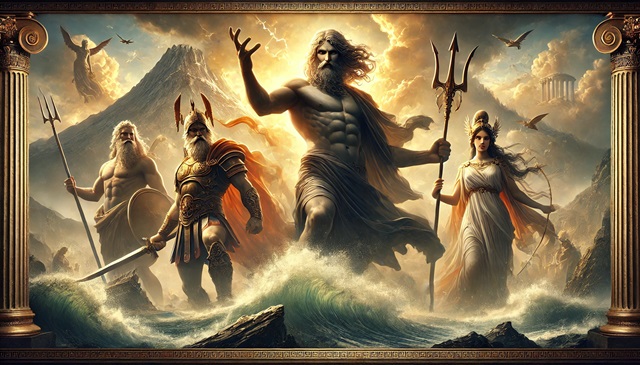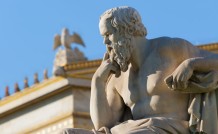Online Class: World Religions 101

no certificate
with CEU Certificate*
-
9Lessons
-
27Exams &
Assignments -
3,174Students
have taken this course -
9Hours
average time -
0.9CEUs
Course Description
Journey through World Religions
In an ever-globalizing world, understanding the cultural tapestries that unite and diversify humanity has never been more pertinent. At the heart of these cultural distinctions and commonalities are the world religions, each bearing its own history, philosophy, and influence on humanity's collective story. World Religions 101 is your passport to an enlightening exploration of these profound systems of belief and their immeasurable impacts on today's global events.
Dive deep into the intricacies of beliefs and philosophies, ranging from the familiar tenets of major religions to the esoteric traditions of lesser-known faiths. Delve into the depths of karma, unearth the tranquility in nirvana, balance the duality of yin and yang, and fathom the mysteries of the Holy Trinity.
Religion is often perceived primarily as a system of faith, manifesting through prayer, worship, and a commitment to a higher power. However, as you journey through this course, you'll discover that many religions transcend mere belief in a deity. They encompass an all-encompassing philosophy, a code of ethics, and a way of life that influences decisions, both monumental and mundane.
Course Highlights:
-
Foundational Knowledge: Learn about the central figures, epoch-making events, and fundamental teachings that constitute major religions like Hinduism, Christianity, Judaism, Buddhism, Islam, Confucianism, and Taoism.
-
Diverse Spiritual Explorations: Dive into an array of beliefs and practices across various cultures and timelines. Grasp the essence of religious experiences, from the fervent prayer sessions in a mosque to the meditative rituals in Buddhist monasteries.
-
Inclusive Learning: This course is not limited to just major religions. It expands its horizon by including brief yet insightful descriptions of other spiritual practices and religious movements, ensuring a holistic appreciation of global faith practices.
Course Breakdown:
-
An Introduction to the Religious Experience: Initiate your journey by understanding the essence of spiritual experiences and their universal appeal across different religions.
-
Buddhism: Step into the world of the Four Noble Truths and the Eightfold Path. Discover the life of Siddhartha Gautama and the essence of Buddhist teachings.
-
Christianity: Explore the life and teachings of Jesus Christ, the significance of the Bible, and the diverse denominations within Christianity.
-
Confucianism: Understand the teachings of Confucius, a philosophy that has shaped East Asian societies with its focus on ethics, family, and societal harmony.
-
Hinduism: Delve into the world's oldest religion, its sacred scriptures, multitude of gods and goddesses, and its profound philosophical schools.
-
Islam: Understand the pillars of Islam, the significance of the Quran, and the life of Prophet Muhammad.
-
Judaism: Trace the history of the Jewish people, their sacred texts, and the core beliefs and traditions of Judaism.
-
Taoism: Embark on a journey through Taoist philosophies, the significance of Tao Te Ching, and its influence on Chinese culture and beyond.
-
Other Religions and Religious Movements: Venture beyond the mainstream and explore an array of diverse spiritual practices that have shaped communities and cultures worldwide.
Why World Religions 101?
Religions, with their intricate ceremonies, sacred texts, and profound philosophies, are more than just systems of belief. They are repositories of millennia-old wisdom, narratives of human experiences, and mirrors reflecting the moral and ethical standards of societies.
By enrolling in this self-paced course, you not only enhance your understanding of global spiritual practices but also foster a sense of respect and appreciation for the myriad ways humans seek purpose, solace, and understanding in this vast universe.
Step into this enlightening journey and appreciate the multifaceted mosaic of human belief and spirituality. All are welcome in this odyssey of understanding and discovery.
Course Motivation
In our modern, secular Western society, where it seems as though more and more emphasis is placed on objective knowledge and empirical (scientific) forms of understanding the world, some may not have had an opportunity to examine the very nature of religion itself. Since this concept is basic to understanding the other ideas presented later in this course, the idea of religion and its nature will be examined here before proceeding on to present the major religions of the world.
Definitions of Terms: Philosophy, Religion, and World View
The word philosophy is derived from the combination of two Greek root words philos (meaning love) and Sophia (meaning wisdom). Thus, the term literally means "the love of wisdom". This definition, though literally correct, lacks something to be desired. What, after all, is wisdom? According to the ancient Greeks, wisdom deals with virtue, the quest for true knowledge and understanding, and the elimination of all false opinions.
Course Structure
Introduction
Symbols and Holy Writ
Daily Practice
World Religions 101: Insight into Spiritual Philosophies
In our intricately intertwined global society, religion remains a driving force behind numerous cultural, societal, and political actions. Whether it is the celebration of diverse festivals, guiding life philosophies, or geopolitical events, the imprints of religion are unmistakable. "World Religions 101" is your gateway to uncovering the multifaceted tapestry of religious beliefs that have sculpted our world.
Course Rationale: At its core, religion isn’t merely a conduit to the divine. It encapsulates millennia of history, traditions, philosophies, and lifestyles. As many of us associate religion with rituals, deities, and sacred scriptures, this course goes beyond these notions. It emphasizes religion as an evolving entity, mirroring societal transformations, ethical standpoints, and intricate human emotions.
A rudimentary glance at global news reveals that religious beliefs and practices are frequently at the foreground. Consequently, understanding these beliefs not only promotes harmony and inclusivity but also fosters a well-rounded global perspective.
Course Highlights:
-
Foundations of Religion: Unearth the intrinsic human yearning for spirituality. Discover concepts like karma, nirvana, yin and yang, and the Holy Trinity.
-
Buddhism: Delve into the Four Noble Truths, the Eightfold Path, and the life of Siddhartha Gautama.
-
Christianity: Explore the teachings of Jesus Christ, the significance of the Holy Bible, and the spread of Christianity.
-
Confucianism: Understand the teachings of Confucius, emphasizing familial respect, ethical integrity, and societal harmony.
-
Hinduism: Immerse in the world of deities, scriptures, and the cyclical nature of life and rebirth.
-
Islam: Learn about Prophet Muhammad, the Five Pillars, and the Quran's essence.
-
Judaism: Delve into the Torah, the traditions, and the history of the Jewish people.
-
Taoism: Understand the principles of natural order, the Tao, and the balance of Yin and Yang.
-
Lesser-Known Religions: Venture into diverse spiritual paths and practices beyond mainstream doctrines.
Assessments and Interactions: Each lesson culminates in activities and assessments to gauge understanding. Secure a score of 70% or higher to excel. Engage in enriching discussions with peers and directly connect with instructors via email for personalized guidance.
Why Choose This Course? World Religions 101 offers:
-
Flexibility: Navigate this self-paced course from your home, aligning with your schedule.
-
Inclusivity: Irrespective of your prior knowledge, the course welcomes all with a high school reading level and a zest for learning.
-
Comprehensive Resources: Lessons are exhaustive and enriched with external web links for a holistic learning experience.
Conclusion: In the current global milieu, characterized by diversity and interconnectedness, understanding religious underpinnings is pivotal. This isn't merely academic. It's about nurturing respect, promoting dialogue, and cultivating global harmony.
By embracing World Religions 101, you’re not just gaining knowledge. You're fostering empathy, broadening perspectives, and enhancing societal harmony. You're preparing to navigate our diverse world with understanding and respect.
So, why wait? Enroll in World Religions 101 today and commence a journey of spiritual enlightenment and global understanding.
- Completely Online
- Self-Paced
- Printable Lessons
- Full HD Video

- 6 Months to Complete
- 24/7 Availability
- Start Anytime
- PC & Mac Compatible
- Android & iOS Friendly
- Accredited CEUs

Course Lessons
Lesson 1. An Introduction to the Religious Experience
 Lesson 1 Video A
Lesson 1 Video A
 Lesson 1 Video B
: Introduction Discussion
Lesson 1 Video B
: Introduction Discussion
 Lesson discussions: World Religions (a); World Religions (b); Reasons for Taking this Course
Lesson discussions: World Religions (a); World Religions (b); Reasons for Taking this Course Complete: Lesson 1 Assignment: Introduce Yourself
Complete: Lesson 1 Assignment: Introduce Yourself Complete Assignment: Differing views of the New and Old Testament
Complete Assignment: Differing views of the New and Old Testament Complete Assignment: Why do Humans have Religion?
Complete Assignment: Why do Humans have Religion? Assessment: Lesson 1 Quiz: Introduction to World Religions
Assessment: Lesson 1 Quiz: Introduction to World Religions
Lesson 2: Buddhism
 Lesson 2 Video A
Lesson 2 Video A
 Lesson 2 Video B
: Lesson Discussion
Lesson 2 Video B
: Lesson Discussion
 Complete: Lesson 2: Assignment
Complete: Lesson 2: Assignment Complete Assignment: Is Buddhism Relevant Today?
Complete Assignment: Is Buddhism Relevant Today? Assessment: Lesson 2 Quiz: Buddhism
Assessment: Lesson 2 Quiz: Buddhism
Lesson 3. Christianity
 Lesson 3 Video A
Lesson 3 Video A
 Lesson 3 Video B
: Lesson Discussion
Lesson 3 Video B
: Lesson Discussion
 Complete: Lesson 3: Assignment
Complete: Lesson 3: Assignment Complete Assignment: Protestant Reformation
Complete Assignment: Protestant Reformation Assessment: Lesson 3 Quiz: Christianity
Assessment: Lesson 3 Quiz: Christianity
Lesson 4. Confucianism
 Lesson 4 Video A
Lesson 4 Video A
 Lesson 4 Video B
: Lesson Discussion
Lesson 4 Video B
: Lesson Discussion
 Complete: Lesson 4: Assignment
Complete: Lesson 4: Assignment Complete Assignment: Is Confucianism a Religion?
Complete Assignment: Is Confucianism a Religion? Assessment: Lesson 4 Quiz: Confucianism
Assessment: Lesson 4 Quiz: Confucianism
Lesson 5. Hinduism
 Lesson 5 Video A
Lesson 5 Video A
 Lesson 5 Video B
: Lesson Discussion
Lesson 5 Video B
: Lesson Discussion
 Complete: Lesson 5: Assignment
Complete: Lesson 5: Assignment Complete Assignment: Is Hinduism Growing?
Complete Assignment: Is Hinduism Growing? Assessment: Lesson 5 Quiz: Hinduism
Assessment: Lesson 5 Quiz: Hinduism
Lesson 6. Islam
 Lesson 6 Video A
Lesson 6 Video A
 Lesson 6 Video B
: Lesson Discussion
Lesson 6 Video B
: Lesson Discussion
 Complete: Lesson 6: Assignment
Complete: Lesson 6: Assignment Complete Assignment: Muslim Growth
Complete Assignment: Muslim Growth Assessment: Lesson 6 Quiz: Islam
Assessment: Lesson 6 Quiz: Islam
Lesson 7. Judaism
 Lesson 7 Video A
Lesson 7 Video A
 Lesson 7 Video B
: Lesson Discussion
Lesson 7 Video B
: Lesson Discussion
 Complete: Lesson 7: Assignment
Complete: Lesson 7: Assignment Complete Assignment: Differences between Judaism and Christianity
Complete Assignment: Differences between Judaism and Christianity Assessment: Lesson 7 Quiz: Judaism
Assessment: Lesson 7 Quiz: Judaism
Lesson 8. Taoism
 Lesson 8 Video A
Lesson 8 Video A
 Lesson 8 Video B
: Lesson Discussion
Lesson 8 Video B
: Lesson Discussion
 Complete: Lesson 8: Assignment
Complete: Lesson 8: Assignment Complete Assignment: What is up with Taoism?
Complete Assignment: What is up with Taoism? Assessment: Lesson 8 Quiz: Taoism
Assessment: Lesson 8 Quiz: Taoism
Lesson 9. Other Religions and Religious Movements
 Lesson 9 Video A
Lesson 9 Video A
 Lesson 9 Video B
: Lesson Discussion
Lesson 9 Video B
: Lesson Discussion
 Lesson discussions: Course Completion Poll: Your Thoughts; Program Evaluation Follow-up Survey (End of Course); Course Comments
Lesson discussions: Course Completion Poll: Your Thoughts; Program Evaluation Follow-up Survey (End of Course); Course Comments Complete Assignment: What is Wicca?
Complete Assignment: What is Wicca? Assessment: Lesson 9 Quiz: Other Religions & Religious Movements
Assessment: Lesson 9 Quiz: Other Religions & Religious Movements
Learning Outcomes
- Summarize Buddhism.
- Summarize Christianity.
- Summarize Confucianism.
- Summarize Hinduism.
- Summarize Islam.
- Summarize Judaism.
- Summarize Taoism.
- Demonstrate mastery of lesson content at levels of 70% or higher.
Additional Course Information

- Document Your Lifelong Learning Achievements
- Earn an Official Certificate Documenting Course Hours and CEUs
- Verify Your Certificate with a Unique Serial Number Online
- View and Share Your Certificate Online or Download/Print as PDF
- Display Your Certificate on Your Resume and Promote Your Achievements Using Social Media

Choose Your Subscription Plan
No Certificate / No CEUs
This course only
| Includes certificate | X |
| Includes CEUs | X |
| Self-paced |

|
| Instructor support |

|
| Time to complete | 6 months |
| No. of courses | 1 course |
Certificate & CEUs
This course only
| Includes certificate |

|
| Includes CEUs |

|
| Self-paced |

|
| Instructor support |

|
| Time to complete | 6 months |
| No. of courses | 1 course |
Certificates & CEUs
Includes all 600+ courses
| Includes certificate |

|
| Includes CEUs |

|
| Self-paced |

|
| Instructor support |

|
| Time to complete | 12 Months |
| No. of courses | 600+ |
Certificates & CEUs
Includes all 600+ courses
| Includes certificate |

|
| Includes CEUs |

|
| Self-paced |

|
| Instructor support |

|
| Time to complete | 24 Months |
| No. of courses | 600+ |
Student Testimonials
- "I have long wanted to learn and better understand world religions and how they have progressed to modern day and how it has related to man and his societies. I feel I got that from this course...but more over...I felt that Mac had done an excellent job in helping me understand all faiths and how they actually have similarities and their differences and why. I feel I got more out of this course then I had intended. Great job guys." -- Michael M.
- "This course was great fun for me, and gave me a chance to be a student again for a while and to learn a great deal. Professor McKenna was very knowledgeable, approachable and fair, and has a great sense of humor!" -- Kate D.
- "The instructor is very dedicated to his classroom studies. He provides additional videos that he produces for each lesson. I always enjoy taking his courses and always learn a lot from his videos and the assignments for each lesson." -- Louise S.
- "I have said many times that I like learning with this instructor. He is challenging while also approachable. Our interactions are thought provoking and interesting." -- Theresa B.
- "He is very personable and I enjoyed conversing with him about the different subjects of the course." -- Marshall G.
- "He is really great and glad he teaches so much. He is so informational." -- Anna D.
- "A very good delivery and execution. I learned a lot in this class." -- Jessie D.
- "The course and instructor were both great." -- Shari G.
- "Thanks for making this kind of course work available to those of us at home." -- Margaret T.
- "The course layout was very rganized. The requirements for each lesson were very clear and detailed. The assignments were relevant to add useful information to one's everyday knowledge. Thanks...." -- Margaret T.
Related Courses
-
 21 hours
2.1 CEUs
American Wars: American Revolution and Civil War
+ More Info
21 hours
2.1 CEUs
American Wars: American Revolution and Civil War
+ More Info
-
 34 hours
3.4 CEUs
Reiki Ultimate 5 Course Bundle: Reiki Levels 1-5
+ More Info
34 hours
3.4 CEUs
Reiki Ultimate 5 Course Bundle: Reiki Levels 1-5
+ More Info
-
 7 hours
0.7 CEUs
American Literature Review
+ More Info
7 hours
0.7 CEUs
American Literature Review
+ More Info
-
 4 hours
0.4 CEUs
Chakras Level 1
+ More Info
4 hours
0.4 CEUs
Chakras Level 1
+ More Info
-
 5 hours
0.5 CEUs
Auras: Viewing, Identifying, and Understanding
+ More Info
5 hours
0.5 CEUs
Auras: Viewing, Identifying, and Understanding
+ More Info
-
 6 hours
0.6 CEUs
Emotional Healing 101
+ More Info
6 hours
0.6 CEUs
Emotional Healing 101
+ More Info
-
 7 hours
0.7 CEUs
History's Greatest Conspiracies
+ More Info
7 hours
0.7 CEUs
History's Greatest Conspiracies
+ More Info
-
 5 hours
0.5 CEUs
Anxiety Therapy 101
+ More Info
5 hours
0.5 CEUs
Anxiety Therapy 101
+ More Info
-
 8 hours
0.8 CEUs
Twenty Women Who Changed American History
+ More Info
8 hours
0.8 CEUs
Twenty Women Who Changed American History
+ More Info
-
 15 hours
1.5 CEUs
Sociology 101
+ More Info
15 hours
1.5 CEUs
Sociology 101
+ More Info
-
 8 hours
0.8 CEUs
American Heroes and Villains
+ More Info
8 hours
0.8 CEUs
American Heroes and Villains
+ More Info
-
 4 hours
0.4 CEUs
Salem Witch Trials
+ More Info
4 hours
0.4 CEUs
Salem Witch Trials
+ More Info
-
 16 hours
1.6 CEUs
World War ll
+ More Info
16 hours
1.6 CEUs
World War ll
+ More Info
-
 7 hours
0.7 CEUs
Greek Mythology
+ More Info
7 hours
0.7 CEUs
Greek Mythology
+ More Info
-
 16 hours
1.6 CEUs
The Gulf War
+ More Info
16 hours
1.6 CEUs
The Gulf War
+ More Info
-
 12 hours
1.2 CEUs
Philosophy 101
+ More Info
12 hours
1.2 CEUs
Philosophy 101
+ More Info
-
 11 hours
1.1 CEUs
Vietnam War
+ More Info
11 hours
1.1 CEUs
Vietnam War
+ More Info
-
 5 hours
0.5 CEUs
Angel Healing
+ More Info
5 hours
0.5 CEUs
Angel Healing
+ More Info
-
 11 hours
1.1 CEUs
World War I
+ More Info
11 hours
1.1 CEUs
World War I
+ More Info
-
 10 hours
1.0 CEUs
Ancient Civilizations 101
+ More Info
10 hours
1.0 CEUs
Ancient Civilizations 101
+ More Info
-
 7 hours
0.7 CEUs
History of the Universe
+ More Info
7 hours
0.7 CEUs
History of the Universe
+ More Info
-
 13 hours
1.3 CEUs
American History Review
+ More Info
13 hours
1.3 CEUs
American History Review
+ More Info
-
 6 hours
0.6 CEUs
Exploring Metaphysics: Journey into Self-Discovery
+ More Info
6 hours
0.6 CEUs
Exploring Metaphysics: Journey into Self-Discovery
+ More Info









